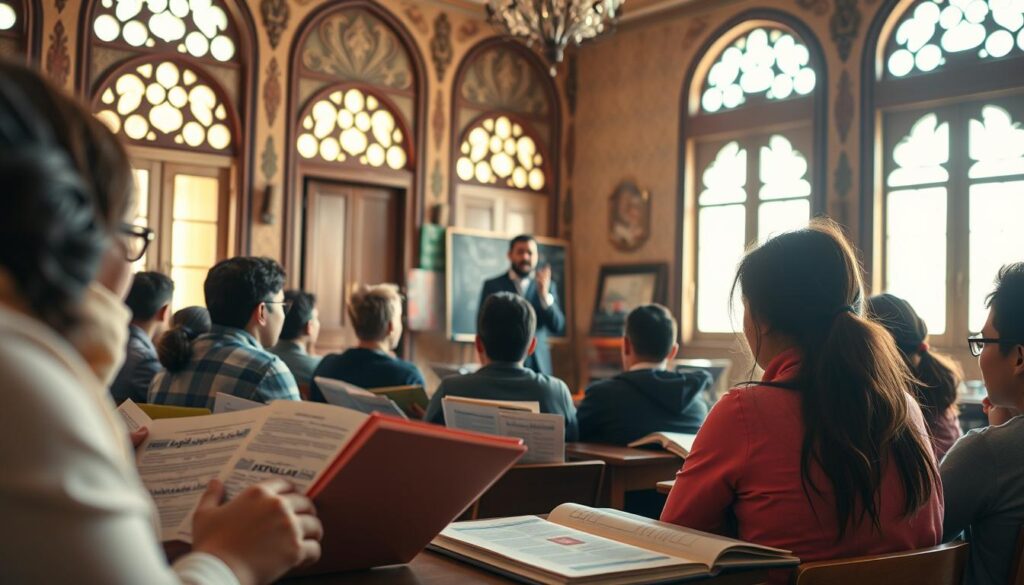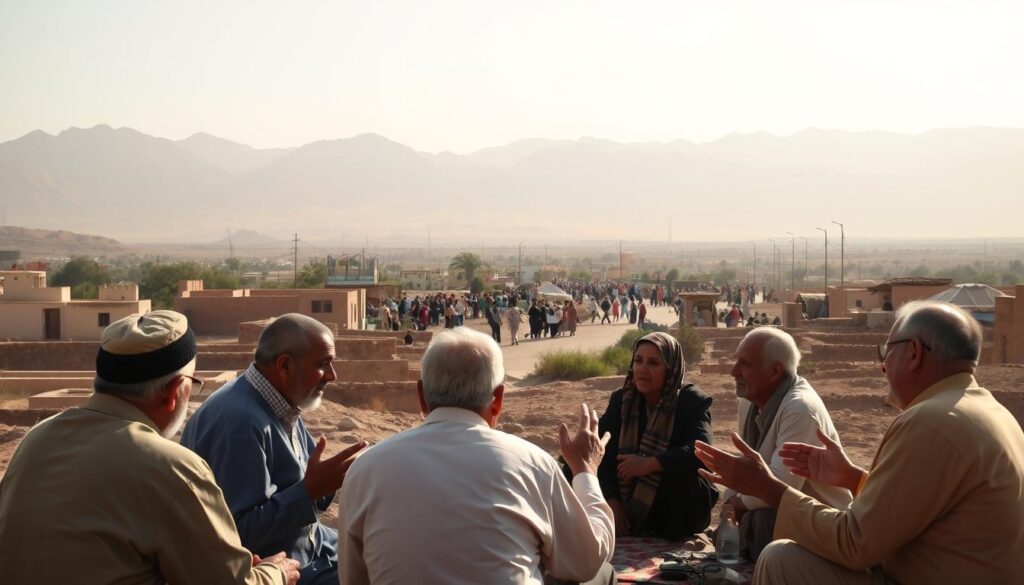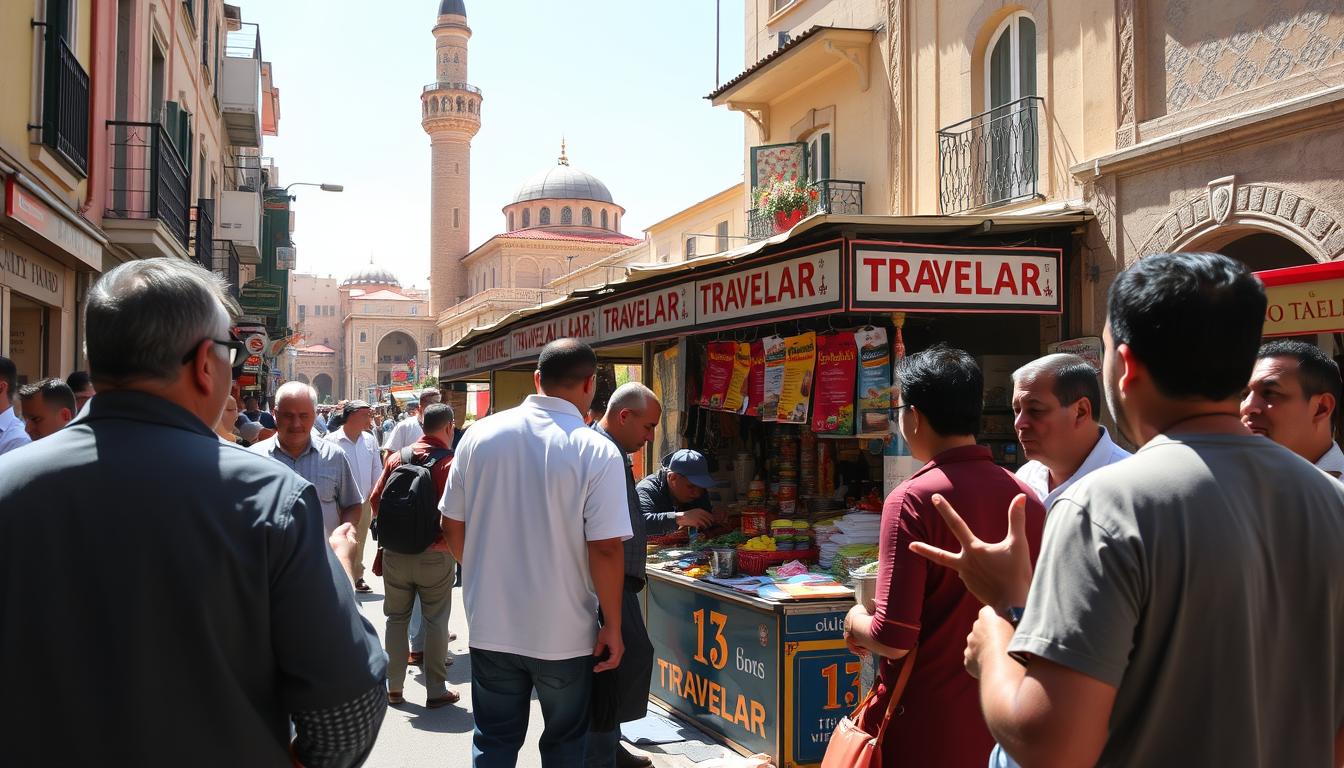The Algerian dialect is a unique and fascinating language. It shows the country’s rich cultural heritage. It has its own distinct features that make it different from other North African dialects.
Exploring Algerian Arabic lets us communicate with native speakers. We gain insights into the country’s history and culture. Understanding the Algerian dialect is key to grasping Arabic language dialects.
Tools like the Romanized Algerian Arabic Translator help us dive into Algerian literature. We discover the beauty of the Algerian dialect. It’s a vital part of Algerian identity.
The Algerian dialect reflects the country’s cultural diversity. It’s influenced by Arabic, Berber, and other languages. Exploring it helps us understand the country’s history, culture, and identity.
The Algerian dialect is a reflection of the country’s cultural diversity. It’s a unique and fascinating language to explore. As we explore the Algerian dialect, we gain a deeper understanding of the country’s history, culture, and identity.
Table of Contents
Overview of the Algerian Dialect
The Algerian dialect, also known as Darija, is spoken in Algeria and parts of North Africa. It has its own unique sound, words, and rules. This makes it different from other Arabic forms, like Maghrebi dialect and Arabic varieties. About 36 million people speak Algerian Arabic, making up 75% to 80% of Algeria’s population.
Many languages, including French, Turkish, and Spanish, have shaped Algerian Arabic. This is seen in its vocabulary, with many loanwords. The sound system of Algerian Arabic is also special, with 28 consonant sounds. These sounds are mostly found in French loanwords.
Studying Algerian Arabic gives us a peek into Algeria’s history, literature, and society. For instance, Ahlam Mosteghanemi’s “The Bridges of Constantine” shows how language shapes identity. The dialects in Algeria vary due to geography and city life, creating a unique “koine” for each place.
Key Characteristics of the Algerian Dialect
The Algerian dialect has its own sound, words, and rules. It keeps many sounds from Classical Arabic that other dialects have lost. The way it forms plurals and verbs is also unique. Verbs change based on tense, but not by gender in the second and third person plural.
- Unique pronunciation and vocabulary
- Retains phonetic elements of Classical Arabic
- Distinct grammatical structure, including verb conjugation and plural formation
- Influenced by French, Turkish, and Spanish due to historical colonization
The Algerian dialect is a key part of Algerian culture and identity. It offers insights into the country’s history, literature, and society. As a Maghrebi dialect, it’s also a vital part of the Arabic language family, used by about 420 million people worldwide.
Historical Context of the Algerian Dialect
The Algerian language has a rich history. It shows the country’s cultural and linguistic heritage. Arabic, Berber, and French have shaped its unique features.
Arabic became Algeria’s official language in 1990. Most Algerians speak various dialects of Arabic. The Amazigh language, or Tamazight, is also spoken by many, often alongside Arabic.
The Algerian War of Independence had a big impact on the language and culture. The war destroyed nearly 8,000 villages and displaced about 3 million people.
Influences from Arabic and Berber Languages
The Algerian dialect has been shaped by Arabic and Berber. Arabic is more dominant, but Berber has a big influence in the north.
Impact of Colonialism on Language Evolution
Colonialism changed the Algerian dialect. French was introduced as a second language. Many Algerians use French, mainly in cities. Yet, the Algerian dialect remains a key part of the culture and a symbol of resistance.
- Arabic is the official national language of Algeria
- Berber is spoken in several geographic dialects by Algeria’s ethnic Imazighen
- French is widely used in government, culture, media, and education throughout Algeria
| Language | Speakers | Percentage |
|---|---|---|
| Arabic | 26 million | 72% |
| Berber | 10 million | 27.4% |
| French | 10 million | 33% |
Geographic Variations in the Algerian Dialect
The Algerian dialect, also known as Algerian Arabic or Darija, shows big differences across the country. These differences come from the many cultural and language influences over time. Knowing these differences helps us see the rich and complex nature of the Algerian dialect.
The location plays a big role in these differences. In cities like Algiers, the dialect is more mixed with French and other languages. This makes the urban dialect unique. But in rural areas, the dialect stays closer to traditional Arabic varieties and Berber languages.
Here are some main differences between city and countryside dialects:
- Vocabulary: City dialects use more French and foreign words. Rural dialects stick to traditional Algerian Arabic.
- Pronunciation: City dialects sound more French, while rural dialects keep a traditional Darija sound.
- Grammar: City dialects have more complex grammar. Rural dialects keep it simple.
The Romanized Algerian Arabic Translator helps users see these differences. It shows the variety in the Algerian dialect. By looking at the different Arabic varieties and Darija dialects, users can understand Algeria’s rich culture and language.
The Role of French in Algerian Dialect
The Algerian language has been shaped by many influences, including French. The Maghrebi dialect, widely spoken in Algeria, shows the country’s complex history and cultural diversity. French has had a big impact on the Algerian dialect, with many Algerians using French as a second language.
In daily talks, switching between French and Algerian is common, mainly in cities. People switch languages to mean different things or to express themselves better. French words and phrases have become a big part of the Algerian dialect.
Ahlam Mosteghanemi’s novel “The Bridges of Constantine” looks at how language shapes identity and the effects of colonialism. It shows the complex ties between language, culture, and identity in Algeria. The use of French in the Algerian dialect shows the country’s history of colonization and ongoing cultural exchange with France.
Some key features of the Algerian dialect include:
- Code-switching between French and the Algerian language
- Adoption of French vocabulary and expressions
- Influence of French on the dialect’s grammar and syntax
The Algerian language, including the Maghrebi dialect, is a unique and important part of the country’s cultural heritage. Understanding French’s role in the Algerian dialect gives valuable insights into the country’s history, culture, and identity.
Social Aspects of the Algerian Dialect
The Algerian dialect is key in shaping social identity in Algeria. It’s a big part of the country’s cultural heritage. The idea of umma, or community, is deeply connected to this dialect. It shows the complex social and cultural identity of Algeria.
In Algeria, Algerian Arabic is widely spoken. It’s a big part of the country’s culture. The North African dialect has also influenced the language, adding words and phrases from other languages. The Algerian dialect mixes Arabic, Berber, and French, showing the country’s rich heritage.
The Algerian dialect is used in media and culture. Many artists and writers use it in their work. This has made the language more popular and accessible. Schools and universities also teach the dialect.
The social aspects of the Algerian dialect are complex. The language is closely linked to the country’s history, culture, and identity. It continues to shape social norms and values. Understanding the dialect gives insights into Algeria’s cultural and linguistic diversity.
| Language | Speakers | Percentage |
|---|---|---|
| Arabic | 25 million | 81% |
| Berber | 7 million | 27% |
| French | 11 million | 33% |
Learning the Algerian Dialect
There are many ways to learn the Algerian dialect. The Algerian language mixes Arabic, Berber, French, and more. It’s spoken by about 31 million people in Algeria, making it key for those who want to understand the area’s culture and language.
Start by using online tools like language courses and apps. The Romanized Algerian Arabic Translator is great for learning and practicing. You can also join language exchange programs and cultural events to speak with native speakers.
Here are some tips for improving your Algerian dialect skills:
- Listen to native speakers and try to copy their way of speaking.
- Practice speaking with native speakers, either in person or online.
- Watch Algerian movies and TV shows to see how the dialect is used.

Follow these tips and use the resources available. This way, you can get better at speaking Algerian and learn more about Algeria’s culture. The Algerian dialect is a big part of Algeria’s heritage, and learning it can be very rewarding.
Challenges in Preserving the Algerian Dialect
The Algerian dialect, also known as Darija, is a key part of Algeria’s culture. But, it’s facing big challenges because of globalization. Young Algerians are often choosing to speak French or English instead, which makes keeping the dialect alive harder. Recent studies show that Darija’s use is going down among the young.
One big problem is that Darija isn’t taught in schools. Arabic is the official language, and French is common in schools, but Darija is not. This makes it tough for the young to learn and use it every day. Efforts to promote the use of Darija are being made, like language programs and cultural events.
Even with these hurdles, many are working to save the Algerian dialect. For example, Ahlam Mosteghanemi’s book “The Bridges of Constantine” highlights the need to keep the dialect alive. Also, online resources help people learn and practice the dialect.
Here are some ways to keep the Algerian dialect alive:
- Language programs and cultural initiatives
- Online resources and language learning tools
- Encouraging the use of Darija in daily life
The Future of the Algerian Dialect
The Algerian language is a mix of Arabic, Berber, and French. The Maghrebi dialect is a big part of Algeria’s culture. Looking ahead, we must think about how language use will change and how tech can help keep the dialect alive.
Projects like the Hadretna project are working to boost Algerian Arabic, Daridja. They use apps and social media to teach it. They’ve built a big language model from lots of data, aiming to make it even bigger. This tech can help keep the dialect alive, mainly among the young.

- Increased use of language learning apps and social media to promote the dialect
- Development of large language models to process and preserve the dialect
- Growing recognition of the importance of linguistic diversity in Algeria
The Algerian dialect’s future is uncertain, but tech and awareness can help. By understanding new trends and tech’s role, we can ensure the Algerian language, including the Maghrebi dialect, stays vibrant.
Conclusion: Celebrating the Algerian Dialect
The Algerian dialect is a treasure that shows the country’s rich culture. As we wrap up our look at Algerian Arabic, it’s key to celebrate its importance. We should also keep exploring North Africa’s linguistic variety.
The Algerian dialect is more than just a way to talk. It carries the stories, traditions, and identity of the Algerian people. By keeping this dialect alive, we help keep Algerian culture vibrant for future generations.
Tools like the Romanized Algerian Arabic Translator are important. They help people understand and connect with the language. This can spark a new interest in language and culture exchange. It helps us celebrate the Algerian dialect as a vital part of Algerian identity and a link between different communities.
Source Links
- Finding the Umma: A Conceptual Exploration of Algerian-French Periodicals in the Interwar Period (1930-1939) – https://dhip.hypotheses.org/4005
- Exploring Ethnic Groups And Indigenous Languages – Afro Discovery – https://www.afrodiscovery.com/country/morocco/morocco-tribes-languages/moroccos-cultural-diversity-exploring-ethnic-groups-and-indigenous-languages/
- Algerian Arabic – https://en.wikipedia.org/wiki/Algerian_Arabic
- An Algerian dialect: Study and Resources – https://hal.science/hal-01297415v1/file/Paper_53-An_Algerian_dialect_Study_and_Resources.pdf
- Algeria – Arabic, Berber, French | Britannica – https://www.britannica.com/place/Algeria/Languages
- Exploring Algerian Language Spoken In Algeria: Spoken And Official Languages Of Algeria – https://languagexs.com/algerian-language-diversity/
- Algeria Languages – https://www.familysearch.org/en/wiki/Algeria_Languages
- The Colonial Hangover: How French Words Perpetuate a Continuity of Colonial Attitudes Against Algerians | Oxford Political Review | Oxford Political Review – https://oxfordpoliticalreview.com/2024/08/25/the-colonial-hangover-how-french-words-perpetuate-a-continuity-of-colonial-attitudes-against-algerians/
- French Genocide in Algeria: Time for Introspection – https://www.fairobserver.com/history/french-genocide-in-algeria-time-for-introspection/
- Ali Belabi – https://www.language-and-society.org/wp-content/uploads/2021/05/2020_Dec_Language_Discourse_and_Society_Belaidi.pdf
- Languages of Algeria – https://en.wikipedia.org/wiki/Languages_of_Algeria
- Algerian Arabic language – https://www.omniglot.com/writing/arabic_algerian.htm
- A Linguistic Journey Through Algeria – ILAB Academy – https://ilab.academy/en/a-linguistic-journey-through-algeria/
- Amazigh Language Policy in Algerian Education: Between Revendication and Slow Implementation – ROWAQ ARABI – https://cihrs-rowaq.org/amazigh-language-policy-in-algerian-education-between-revendication-and-slow-implementation/?lang=en
- Algerian AI researchers crowdsource local language data – https://www.middleeastainews.com/p/north-african-ai-large-language-model-data
- Integrated Content & Language in Algerian Higher Education (ICLHE) | Teachers College, Columbia University – https://www.tc.columbia.edu/iclhe-algeria/
- Exploring the Linguistic Diversity of Algeria – Afro Discovery – https://afrodiscovery.com/country/algeria/algeria-tribes-languages/a-tapestry-of-tongues-exploring-the-linguistic-diversity-of-algeria/
- Exploring The Rich Language Diversity Of Algeria: Standard Algerian Berber, Arabic, And French – https://languagexs.com/standard-algerian-berber/
- Culture of Algeria – https://en.wikipedia.org/wiki/Culture_of_Algeria

